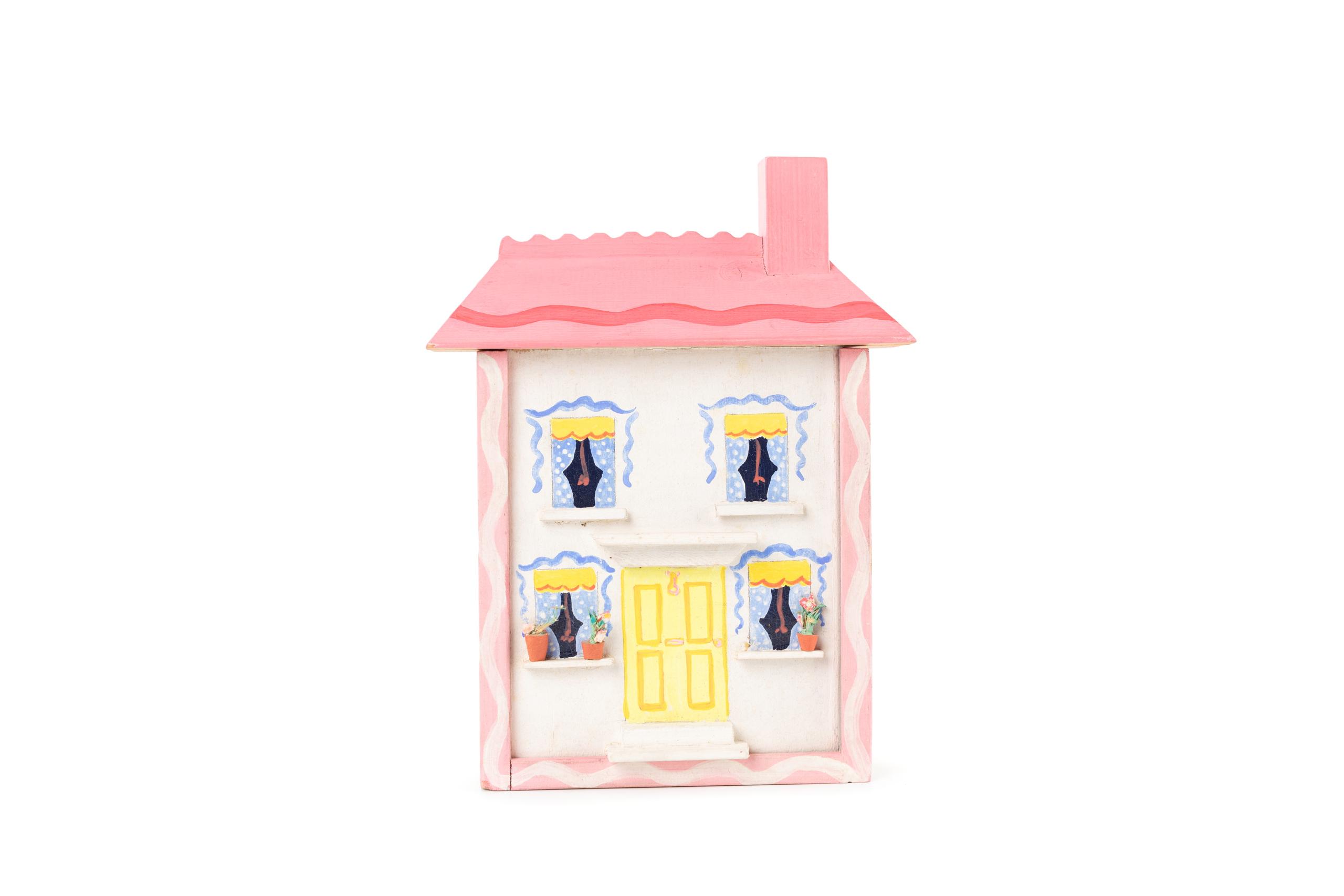Handmade doll's house made by Yootha Rose, England, 1945-1970
Object No. H8765
This miniature furnished dolls house is one of a group of toys in the Museum's collection made by the English toy maker, Yootha Rose, between 1945 and 1970. Yootha Rose crafted handmade and hand-painted wooden toys during the second half of the twentieth century including pull-along carts, carousels, wishing wells, Noah's arks, zoos, Punch and Judy shows and even rabbit warrens with hidden bunnies. For some 25 years she made toys for Britain's Royal family. Yootha was born in Australia in 1899 the daughter of Charles Rose a singer who had performed with Dame Nellie Melba. She was involved in the theatre from a young age and at eighteen moved to England with her family and became a stage performer. Later she undertook costume and stage designs for musical productions. During the Second World War Yootha taught at a boy's school in Dorset and it was there that she began making her wooden toys due to the lack of their availability during wartime austerity in England. Her toys 'roughly hewn but richly detailed…[were] a beguiling blend of the primitive and the sophisticated'. They depict a genteel post-Edwardian world where toy children are accompanied by toy nannies. In 1945 a selection of her toys were exhibited at London's Victoria and Albert Museum's exhibition 'Britain can Make It' and from then on orders began to roll in. During the 1940s and 1950s she was commissioned to make a doll's house for Princess Anne, a carousel for Prince Charles and a miniature village for the children of Princess Alexandra, the Queen's first cousin. Strongly against the mechanised production of toys, Yootha resisted all attempts to mass produce her work. This ensured its vitality and, combined with their bold colouring, vigorous carving and an imaginative use of materials, saw her work full of fantasy and childlike delight. As well as timber, Yootha used everyday items for her creations including cotton reels for hot air balloon baskets and gold-coloured doilies provided gilt for the dresses of paper angels. John Alden at Britain's Hove Museum and Art Gallery says 'the fantasy element in her work may be considered as a reinterpretation of childhood through adult eyes, explaining why her work has such a strong appeal to the collector'. Yootha was not restricted to toy making but contributed greatly to the preservation, presentation and promotion of antique toys. In 1952 she was appointed a trustee of the National Toy Museum and seven years later became its Honorary Curator. In 1956 she was a founding member of the British Toymakers Guild and organised a number of solo exhibitions at galleries and museums. Yootha had married a Mr Phillips but by 1978 was a widow living in Brighton, Sussex, while grandchildren lived in Australia. At this time she resided in a three-storey house filled with toys. Teddy bears sat on the stairs, Chinese mobiles hung from the ceiling and 100 year dolls rested against the walls. Alden, John, blog post 'Toys 'r' Me', Brighton Museum. http://brightonmuseums.org.uk/discover/2015/01/07/toys-r-me/ Salmans, Sandra, 'Craftsmanship in Toys Meets Royal Tastes' in 'Toledo Blade', 4 July 1978, p.9. Margaret Simpson, Curator December 2015
Loading...
Summary
Object Statement
Doll's house, handmade, timber / metal, Yootha Rose, England, 1945-1970
Physical Description
Doll's house, handmade, timber, made by Yootha Rose, England, 1945-1970 Small doll's house made by Yootha Rose. H 6 3/4" x 2 1/2" deep x 4 1/2" wide. Roof and front lift up to reveal furnished interior, condition good. Bare wood painted in parts mainly pint scheme. (OF).
HISTORY
Notes
This object is part of a collection of timber toys bequeathed to the Museum by the late Monica Piddington in 1970. Monica Piddington (1899-1967) was born at Narrandera, New South Wales, and became a kindergarten teacher. In the 1930s she went on to become the first director of the famous Sydney Playways educational toy shop which opened in Dalley Street, near Circular Quay, and was owned by the Kindergarten Union. Apparently Monica travelled around the world collecting toys of 'superior design, craftsmanship and quality' making them available to Australian teachers, parents and children. In the 1960s the shop moved to Clarence Street. After the Kindergarten Union decided to sell the business, it was taken over by the staff, all Early Childhood graduates, and re-opened as the Play House Toy Shop which operated from 1989 until 2007.
SOURCE
Credit Line
Gift of Monica Piddington Memorial Trust, 1970
Acquisition Date
21 September 1970

Copyright for the above image is held by the Powerhouse and may be subject to third-party copyright restrictions. Please submit an Image Licensing Enquiry for information regarding reproduction, copyright and fees. Text is released under Attribution-Non Commercial-No Derivative licence.
Image Licensing Enquiry
Object Enquiry


